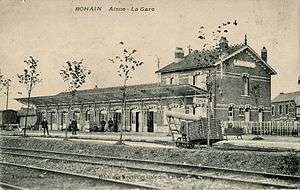Bohain-en-Vermandois
| Bohain-en-Vermandois | ||
|---|---|---|
| Commune | ||
|
Town hall | ||
| ||
 Bohain-en-Vermandois | ||
|
Location within Hauts-de-France region  Bohain-en-Vermandois | ||
| Coordinates: 49°59′11″N 3°27′15″E / 49.9864°N 3.4542°ECoordinates: 49°59′11″N 3°27′15″E / 49.9864°N 3.4542°E | ||
| Country | France | |
| Region | Hauts-de-France | |
| Department | Aisne | |
| Arrondissement | Saint-Quentin | |
| Canton | Bohain-en-Vermandois | |
| Intercommunality | Pays du Vermandois | |
| Government | ||
| • Mayor (2008–2014) | Jean Louis Bricout | |
| Area1 | 31.74 km2 (12.25 sq mi) | |
| Population (2012)2 | 5,841 | |
| • Density | 180/km2 (480/sq mi) | |
| Time zone | CET (UTC+1) | |
| • Summer (DST) | CEST (UTC+2) | |
| INSEE/Postal code | 02095 /02110 | |
| Elevation |
121–164 m (397–538 ft) (avg. 130 m or 430 ft) | |
|
1 French Land Register data, which excludes lakes, ponds, glaciers > 1 km² (0.386 sq mi or 247 acres) and river estuaries. 2 Population without double counting: residents of multiple communes (e.g., students and military personnel) only counted once. | ||
Bohain-en-Vermandois is a commune in the department of Aisne in Hauts-de-France in northern France.
It is the place where the painter Henri Matisse grew up.
History
Formerly called Bohain, the town acquired its current name, Bohain-en-Vermandois in 1956.
Ownership of the territory changed frequently during the medieval period, and Bohain continued to find its lordship disputed in the wars of the early modern period. Traces of fortifications (ditches, cannonballs, bases of walls) can not only be found near to the primary school, but also in other spots of the town.
In its past, Bohain being unequivocally incorporated within France, industry and trading developed and the town became a major center for the textile industry. In parish records from the 17th century one of the most frequent occupations registered was that of "mulquinier", although the term is generally used to refer to fine fabrics craftworkers, it seems likely that in these very same records the term was also applied to anyone who worked at the weaver's trade.[1] It is recorded that Napoleon ordered a Bohainais weaver to work for the Empress Joséphine. The old textile factories have closed one after another, but weaving is still considered as a local tradition.
It has been reported that the Lord (seigneur) of Bohain gave up Joan of Arc to the English during the Hundred Years' War.
Population
| Historical population | ||
|---|---|---|
| Year | Pop. | ±% |
| 1793 | 2,100 | — |
| 1800 | 2,152 | +2.5% |
| 1806 | 2,346 | +9.0% |
| 1821 | 2,558 | +9.0% |
| 1831 | 3,024 | +18.2% |
| 1836 | 3,393 | +12.2% |
| 1841 | 3,561 | +5.0% |
| 1846 | 3,998 | +12.3% |
| 1851 | 4,166 | +4.2% |
| 1856 | 4,501 | +8.0% |
| 1861 | 5,038 | +11.9% |
| 1866 | 5,322 | +5.6% |
| 1872 | 6,005 | +12.8% |
| 1876 | 6,005 | +0.0% |
| 1881 | 6,684 | +11.3% |
| 1886 | 6,705 | +0.3% |
| 1891 | 6,980 | +4.1% |
| 1896 | 7,423 | +6.3% |
| 1901 | 6,839 | −7.9% |
| 1906 | 6,788 | −0.7% |
| 1911 | 6,877 | +1.3% |
| 1921 | 5,917 | −14.0% |
| 1926 | 6,475 | +9.4% |
| 1931 | 6,614 | +2.1% |
| 1936 | 6,246 | −5.6% |
| 1946 | 5,833 | −6.6% |
| 1954 | 6,151 | +5.5% |
| 1962 | 6,726 | +9.3% |
| 1968 | 7,090 | +5.4% |
| 1975 | 7,513 | +6.0% |
| 1982 | 7,271 | −3.2% |
| 1990 | 6,955 | −4.3% |
| 1999 | 6,593 | −5.2% |
| 2008 | 6,117 | −7.2% |
| 2012 | 5,841 | −4.5% |

See also
References
- ↑ "Une riche tradition du textile (A rich textile tradition)". Bohain's website. Archived from the original on 2008-04-24. Retrieved 2008-07-05.
| Wikimedia Commons has media related to Bohain-en-Vermandois. |

